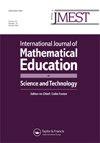Exploring growth mindset experiences in university students
IF 0.6
Q3 EDUCATION & EDUCATIONAL RESEARCH
International Journal of Mathematical Education in Science and Technology
Pub Date : 2023-10-04
DOI:10.1080/0020739x.2023.2255212
引用次数: 0
Abstract
AbstractStudents that classify as having growth mindsets rather than fixed mindsets enjoy greater academic success. This finding has been repeated in a variety of contexts and encourages teachers and researchers to develop growth mindsets in students. However, neutral and negative conclusions from some mindset intervention studies raise questions about the conditions in which growth mindsets develop. This study contributes evidence and suggestions to guide the development and assessment of growth mindsets in university students. The five-stage behaviour change model provides a framework to explain why mindset interventions may cause shifts that are not detected in the short term. Mindset assessment methods with original and adapted scales are presented and critiqued. I compare literature-sourced experiences used in growth mindset interventions with interview data from seven first-year engineering students at a South African university to help determine if growth mindset interventions for university students are worth implementing. I summarise implications for practice when assessing mindsets or using growth mindset interventions.KEYWORDS: Academic achievementuniversity studentsfixed mindsetimplicit theories of intelligencestudent successinterventionbehaviour change AcknowledgementsI am grateful to helpful suggestions from my PhD supervisors Tracy Craig and Brandon Collier-Reed, anonymous reviewers, and members of Helen Sword's WriteSPACE. Special thanks to the students who generously volunteered their time for interviews. This work is adapted from a chapter in my PhD (Campbell, Citation2020).Disclosure statementNo potential conflict of interest was reported by the author.Additional informationFundingThis work was supported by National Research Foundation [grant number TTK160531166788]; University of Cape Town.探索大学生成长心态的体验
【摘要】拥有成长型思维模式的学生比拥有固定型思维模式的学生在学业上更成功。这一发现已经在各种情况下重复,并鼓励教师和研究人员培养学生的成长心态。然而,从一些心态干预研究中得出的中立和消极的结论提出了关于成长心态形成的条件的问题。本研究为指导大学生成长心态的发展与评估提供了依据与建议。五阶段行为改变模型提供了一个框架来解释为什么心态干预可能会导致短期内无法察觉的转变。提出并批判了原有的和适应的心态评估方法。我将成长型心态干预中使用的文献经验与来自南非一所大学七名一年级工程专业学生的访谈数据进行了比较,以帮助确定对大学生实施成长型心态干预是否值得。我总结了在评估心态或使用成长型心态干预时对实践的影响。关键词:学业成就大学生固定思维内隐智力理论学生成功干预行为改变致谢感谢我的博士导师Tracy Craig和Brandon Collier-Reed,匿名审稿人,以及Helen Sword的WriteSPACE的成员给我提供的有益建议。特别感谢那些慷慨地自愿参加面试的学生。这项工作改编自我博士论文中的一章(Campbell, Citation2020)。披露声明作者未报告潜在的利益冲突。本研究由国家研究基金资助[批准号:TTK160531166788];开普敦大学。
本文章由计算机程序翻译,如有差异,请以英文原文为准。
求助全文
约1分钟内获得全文
求助全文
来源期刊

International Journal of Mathematical Education in Science and Technology
EDUCATION & EDUCATIONAL RESEARCH-
CiteScore
3.30
自引率
11.10%
发文量
123
期刊介绍:
Mathematics is pervading every study and technique in our modern world, bringing ever more sharply into focus the responsibilities laid upon those whose task it is to teach it. Most prominent among these is the difficulty of presenting an interdisciplinary approach so that one professional group may benefit from the experience of others. The International Journal of Mathematical Education in Science and Technology provides a medium by which a wide range of experience in mathematical education can be presented, assimilated and eventually adapted to everyday needs in schools, colleges, polytechnics, universities, industry and commerce. Contributions will be welcomed from lecturers, teachers and users of mathematics at all levels on the contents of syllabuses and methods of presentation.
 求助内容:
求助内容: 应助结果提醒方式:
应助结果提醒方式:


